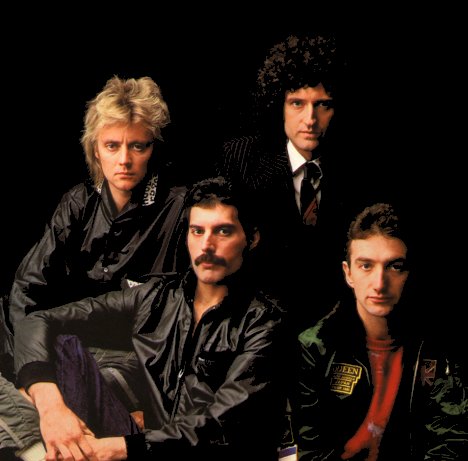03-13-2006 – Philadelphia Daily News – That classic sound
By Howard Gensler
My clock/radio alarm sounded to wake me up for school and WPLJ’s Jim Kerr played a song called “Killer Queen,” by a group I’d never heard of.
My dad had always been in the music business, so I grew up around a lot of records – my parents saw the Beatles at Shea Stadium and Sly and the Family Stone at Madison Square Garden, and I saw the Jefferson Airplane when I was barely old enough to walk – but this “Killer Queen” thing, this was something different.
“She keeps a Moet en Chandon/In a pretty cabinet”
The lyrics were odd for rock – there weren’t too many songs that referenced Soviet leader Nikita Krushchev, even in the 1970s when people knew who he was – the vocal was sort of a mix of Robert Plant, opera and cabaret, and the music was melodic, lilting, driving… different.
The song stuck in my brain.
Who were these guys?
It’s hard to remember the days before the Internet and MTV, but it wasn’t as easy to find stuff out as it is now. I was a kid. I didn’t read Rolling Stone , Creem or Billboard . All I could do to find out more about this “Killer Queen” group was listen to the radio and wait for another song.
“Bohemian Rhapsody.”
What the heck was this? “Rhapsody” was six minutes long with different sections, mixing operatic vocal layering, gibberish and a guitar solo. It had a simple melody line, yet it was bombastic and over the top. It was serious and it was silly. It was unapologetically unique.
And I was hooked.
“You’re My Best Friend” was pop. “39,” which sounded like it could be off a Crosby, Stills & Nash album, was acoustic folk. “Somebody to Love” mixed a simple message with a soaring chorus. “Tie Your Mother Down” was straight-ahead FM rock. “Good Old Fashioned Lover Boy” was vaudeville camp. “Spread Your Wings” was a ballad. “Crazy Little Thing Called Love” was rockabilly, “Another One Bites the Dust” was R&B and “We Will Rock You” and “We Are the Champions” are probably the two most famous stadium rock anthems ever written.
Queen was always different. Yet they were always Queen. Unmistakably Queen. A vocal, guitar, bass and drum sound as singular as any in rock history.
Their popularity waned in the United States in the ’80s, but I always stayed loyal, always stayed curious as to what they might do next. I kept buying the albums (“Hot Space,” “The Works,” “A Kind of Magic”), even when some of them missed the mark, and the singles stopped being played on the radio.
My friends would say, “Queen? Are they still around?”
Then they stole the show at Live Aid and were on top of the world again – in Europe, Japan, South America. But not here.
They stopped playing here. Then lead singer Freddie Mercury took ill, and they stopped playing everywhere.
But they didn’t stop recording. Mercury made a solo album and an album with opera diva Monserrat Caballe. Guitarist Brian May made his own solo albums and produced others, and drummer Roger Taylor recorded solo material (“Happiness” is a terrific album) and with his side group, the Cross.
And while AIDS wore down Mercury, Queen regrouped for “The Miracle” (1989) and “Innuendo” (1991), two mature, introspective albums that stand with their finest ’70s work.
I don’t care if no one in America bought them – or even knew they existed.
The death of Mercury in November 1991 put Queen back in the news and led to a resurgence in sales that exploded when “Wayne’s World” hit theaters the following February, and “Bohemian Rhapsody” rose to the top of the charts again.
The “Freddie Mercury Tribute Concert,” held a few months later in a packed Wembley Stadium in England, brought together the three surviving members for one last concert (Deacon retired afterward) with a suitably eclectic mix of Freddie fans, including Guns ‘N Roses, Def Leppard, Metallica, Extreme, Roger Daltrey, David Bowie, Annie Lennox, Robert Plant, Elton John, George Michael and Liza Minnelli.
Since Queen’s final album of new material, “Made in Heaven,” was released in 1995 – featuring B-sides and partly recorded tracks that were finished after Mercury’s death – Queen has been inducted into the Rock and Roll Hall of Fame and the Songwriters Hall of Fame.
May and Taylor also helped organize South African leader Nelson Mandela’s 46664 concert, performed at Queen Elizabeth’s Jubilee and also worked with writer Ben Elton to craft a rock musical around the band’s hefty catalog of hits. The resulting “We Will Rock You” has broken West End records in England and had companies in Las Vegas, Russia, Spain and Australia.
For a group that never received the critical acclaim of some of their lesser peers (Were they too tuneful? Too campy? Too chameleonlike? Too clever? Too fun?), Queen has had an amazingly long run and left a string of hits that are part of the global musical consciousness.
Perhaps because their style was never tied to a specific era’s sound, their sound has never gone out of style.

